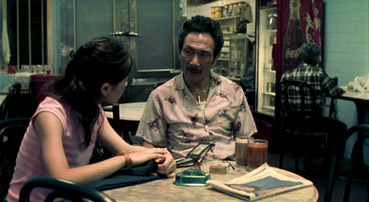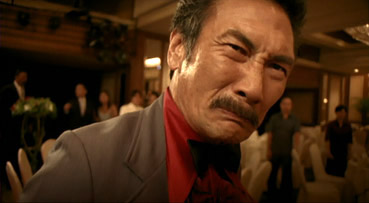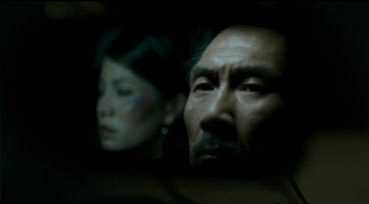There are some spoilers for both this film and Martin Scosese's Taxi Driver below, so proceed with
caution..
When
I hear of new films being directly compared to older films,
particularly older films I am passionate about, I'm never
quite sure how to react, what first impression to too-hastily
form. At its best, this comparison can mean that the new film makes
an equally powerful impact or explores similar themes with
comparable inventiveness. At it's most tiresome, it simply indicates
that it has ripped off the older work and is hiding under a cloak of false originality.
Take
Perth as an example. This has been sold
to us as "Singapore's dark answer to Taxi Driver."
Well Taxi Driver was pretty dark in the
first place and I wasn't aware that it posed a question
that required answering by another film. But that's
beside the point. I have a special relationship with Scorsese's
masterpiece. I was at film school when I first saw it and
it was one of those movies that opened my eyes to the possibilities
of the filmmaking art. It was also one that film students
of the day took to a little too much their hearts, resulting
in an endless stream of crappy scripts that attempted to
imitate it in some way, much like their successors were
doing with Reservoir Dogs and The
Blair Witch Project a few years later. Everyone
loved Taxi Driver so much they wanted to
make it themselves. Well too late, it's already be done,
and done to perfection. Time to move on and have your own
ideas.

Yet in 1986 Neil Jordan made Mona Lisa,
which owed a debt to Taxi Driver so large
that its borrowings bordered on theft. But Jordan and his talented team made these recycled elements work so well that they somehow felt fresh here, which was as much down to the location switch from New York to London as it was to a pair of superb performances from lead players Bob Hoskins and
Cathy Tyson. Crucially, it was the elements not
borrowed from Taxi Driver that ultimately made the
biggest impression, particularly the relationship between
Hoskins' driver and the high class sex worker he is
employed to transport from client to client. Yes, there was violence at the film's
end, but it had none of the cathartic release of Scorsese's
film or its fetishist attitude to handguns. There were precious
few film students pretending to be Bob Hoskins in front
of their bathroom mirrors.
Even
before I listened to the commentary tracks on this DVD, I
guessed that director Djinn had seen Taxi Driver a few times. I'm also willing to bet he's
familiar with Mona Lisa. If he really had
seen neither, I'd be prepared to put Perth
forward for some sort of coincidence award. Before
I get to specifics, try some plot outline and see if any
of this sounds familiar.
Middle-aged Harry Lee loses his
job as a security guard and ends up driving a cab on the
streets of Singapore. He's unhappy with the city and his troubled home life, and his dream is to move to the Australian
city of Perth, where he believes the grass is whole lot
greener than it is in his homeland. The supervisor from his security
guard days, known as Angry Boy Lee, now works for a prostitution
ring and lands Harry a job driving one of the girls, a young
Vietnamese named Mai whom Harry comes to care for and wants
to help leave the business. As the day of his own departure
approaches, a good deed blows up in his face that is destined
to end in violence.
There
are similarities beyond those in the plot: Harry meets and
converses with friend and fellow cab driver Selvam in a
coffee shop, makes cab passengers uncomfortable with his
chat, and is an ex-soldier who practices threats to his own
reflection in a mirror ("Do you know who I am?").
But there's more. The narrative is initially driven by Harry's world-view
voice-over, telling use is made of the cab's rear view mirror,
the violence of the climax is aimed at those exploiting
the prostitutes, and the final scene includes a newspaper
report about the incident, complete with a formal portrait
of its protagonist. And despite his conversations with Selvam
and his drunken cheer, Harry is a lonely and troubled man.

There
appears to have been a determination to crank up the volume
of the detail ported from Scorsese. The language is
stronger ("cunt" is a favourite insult), the lead
character has been made more dislikeable by showing him as an angry
wife-beater, and the climactic violence is more
vicious through the substitution of a machete and a corkscrew
for Travis Bickle's armoury of pistols. But
as with Mona Lisa, there are also significant
differences in character and plot detail, and the location
switch introduces a socio-political element specific to the
locale. I'm guessing that much of this will register instantly
with a Singapore audience, but I'll freely admit that I
only became aware of much of it when I listened to the director's
commentary track, having picked up little from the film
itself. This cultural gap strips the film of some of its
texturing for an audience not familiar with the these elements, which inevitably focusses your attention more
on the recycled components.
A
number of social issues are touched on that are relevant
not just to Singapore society, but to any culture in which
the dissolving of traditional industries is leaving a redundant,
single-skilled workforce in its wake. The trouble is that
this is too often communicated not in cinematic or even
subtextual terms, but by having one character complain loudly
about it to another, coffee shop and bar-room talk that
may well be true to life, but rarely feels naturalistic
and has none of Taxi Driver's dangerous
poetry. And Harry does like to bang his points home – his
intention to move to Perth in particular gets mentioned
so often that I began to wonder if the city had taken out
advertising space in the dialogue.
As
a character study, Perth also something of a mixed bag. Given the choice,
I'll always take a complex, difficult and even not that likeable
anti-hero over an easy (and probably banal) audience
identification figure, and Harry Lee certainly fits that
bill. A lot thus weighs on the shoulders of leading man
Kay Tong Lim, a respected stage actor who shines in the
quieter moments, when it's down to expression and posture
to suggest his feelings and intentions (there's a particularly
effective exchange of looks when Mai returns to his cab
with her face bruised), but is allowed – and probably encouraged –
to push and even tear through the envelope when he loses
his rag or gets drunk, which he does rather a lot. This reaches
a near hysterical peak when he drunkenly gatecrashes his
snottily superior son's wedding, bellows at the top of his
lungs and is dragged out screaming, "WHY DON'T YOU LOVE
ME??" On his commentary track, director Djinn assures
us that he's seen people act just like this, but being factually based does not mean it will automatically convince on film.

Many
will find themselves pining for a little restraint, something
Harry rarely shows. This is especially true of the forty-plus blows
he delivers to his wife's head during one of his temper
tantrums, an assault that would likely leave an ordinary
mortal comatose or dead but here ends just in tears and her immediate departure (mind you, an early Billy
Liar-style fantasy assault on a bus driver suggests
that this later attack may also be a figment of Harry's
warped imagination). At least this prepares you better for
the violent climax, a powerful sequence where excess seems
appropriate, except in the cut-away that precedes it – we
don't need to see that shot of the dead fish three times
to get the symbolism.
Perth
is an interesting and sometimes effective drama hobbled
by a few too many recycled elements, a tendency to let the
characters repeat themselves, and an intermittent drift into
melodrama. I'll admit that I got more out of the film once
I'd listened to the commentary tracks, but this only highlighted
what was not evident without them. It still has its moments,
however, and deserves a small pat on the back for Sunny
Pang's lively, comical but oddly believable turn as Angry
Boy Lee.
Framed
1.85:1 and anamorphically enhanced, this is a solid enough
transfer with decent detail and contrast and appears to
do well on colour, but some creative grading makes it hard
to be sure of accuracy here. Prime colours, on the rare
occasions they make an appearance, are strong.
The
standard three Tartan soundtracks of Dolby stereo 2.0, 5.1
surround and DTS surround are on offer and all share a similar
problem, a slight but noticeable distortion in the trebles
that results in some of the sound having a tinny, broken-up
ring to it. It's the same on all three tracks, but is emphasised
on the 5.1 and DTS, especially if you have the volume cranked
up. The mid and lower frequencies appear fine, although
the 5.1 and DTS tracks are somewhat random in their use
of the surrounds.
Commentary
by director Djinn
Recorded in Los Angeles in what Djinn's producer, Juan Foo (in
a brief introduction), claims is a cupboard, this is a consistently
informative track that covers the expected areas of casting
and production, but also fills us in on the true-life figures
that provided the inspiration for the characters, as well as those
cultural elements that bypassed me on my first viewing.
Some of the comments appear to be responding directly to
what have obviously proved common criticisms, and although
Taxi Driver gets a mention and Djinn admits
that the mirror scene was a direct reference, it's a remark
delivered with a tinge of weariness. A good track nonetheless,
and there's a great anecdote about the filming of a scene
in which Angry Boy indulges in a little road rage.
Commentary
by lead actor Kay Tong Lim
Another interesting track in which Kay Tong Lim (whose speaking
voice is considerably different to Harry's) focuses largely
and inevitably on the character of Harry Lee, from landing
the role to psychoanalysing his thoughts and attitudes.
He also talks about the other actors and the filming of
specific scenes, and openly admits to having trouble understanding
whether one encounter Harry has with his wife is real or
imagined. He makes the Scorsese connection early on with
the suggestion that Angry Boy is the film's Joe Pesci or
Harvey Keitel character and openly discusses the Taxi
Driver connection, though largely to point out
the ways in which Perth is different.
Deleted Scenes with commentary
(5:48)
A number of cut scenes with a fixed commentary by director
Djinn, including some more violence and shouting from Harry
and more expository chat. The scenes themselves are interesting,
but Djinn's commentary here is redundant, including as it
does comments like "Oh, Harry!" as if he's seeing
the footage for the first time, but supplying no reasons
why they were cut in the first place.
Set
Design featurette (11:17)
Set design drawings are matched with photos and clips from
the film with an information-packed explanatory voice-over
by director Djinn, who has to rush to keep up with the images.
Original
trailer (1:31)
An enticing trailer that does its job well enough.
There's
also a trailer for Tartan's release
of Three Extremes.
When
Perth takes the subtle approach and goes
its own way, it scores, but it sometimes shouts when a whisper
would have been more effective. There's also too much here
that UK viewers in particular will have seen before, with
even the social issues tackled more effectively by the likes
of Ken Loach and Alan Bleasdale in years past. Tartan's
DVD is generally a good one, headlined by two very worthwhile
commentary tracks, although that issue with the sound quality does
prove a further barrier to total involvement. One for the
rental list, perhaps, but if you do connect with the film
then the commentaries are definitely worth having.
|